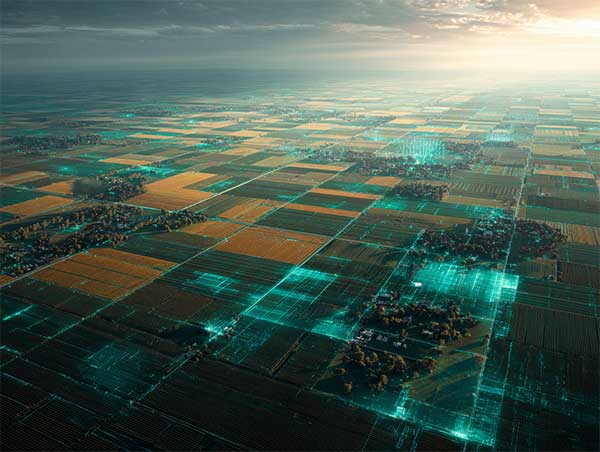
All visuals are AI-generated for illustrative purposes.
Executive Summary
In 2025, EverSphere deployed AgriSynth, a precision agriculture platform that delivered 14% higher yields across pilot regions without requiring additional land use. By optimising inputs, forecasting yields, and integrating logistics intelligence, AgriSynth enables farmers, governments, and NGOs to grow more food sustainably while lowering costs.
Unlike traditional farm-management tools, AgriSynth operates as a holistic intelligence layer: combining EverSphere’s TerraCast climate forecasts, VectorGrid supply chain models, and the Kai optimisation engine to deliver plot-level recommendations and end-to-end resilience.
Industries Impacted
- Agriculture & Food Security
- NGOs & Government Food Programmes
- Commodity Supply Chains
- AgTech & Precision Farming Solutions
Geographies: Pilots across North America, Sub-Saharan Africa, and Southeast Asia, with expansion planned for South Asia and Latin America.
Approach
AgriSynth delivers a unified, predictive framework that supports farmers from seed to shelf.
Data foundation (live, governed, secure)
- Satellite & drone imagery: NDVI, soil moisture, crop health indices.
- Climate inputs: TerraCast’s 96-hour regional forecasts, seasonal anomaly detection.
- Soil & field sensors: IoT probes for pH, salinity, nutrient levels, irrigation flow.
- Market & logistics data: VectorGrid integration for demand signals and transit optimisation.
Core Models
- Yield forecasting: hybrid GNN + transformer model for plot-level productivity.
- Input optimisation: Kai-driven fertiliser, irrigation, and pesticide scheduling, cutting waste by up to 22%.
- Harvest timing: predictive maturity modelling to align peak nutrition with market demand.
- Supply resilience: integration with VectorGrid to reduce spoilage in transit by 17%.
- Explainability: every recommendation carries transparent reason codes (e.g. “Soil moisture deficit + TerraCast heatwave risk → early irrigation cycle triggered”).
System Design
- Human-in-the-loop: farmers approve all recommendations via mobile or dashboard.
- APIs: integration with farm-management software and NGO food-distribution platforms.
- Scalability: designed to operate from smallholder farms to industrial agribusiness.
- Auditability: overseen by Dr Abigail Shaw’s Ethics & Assurance group; equity audits ensure smallholders benefit equally.
Deployment
- Roll-out: lightweight mobile app for farmers; regional cloud backends for large-scale agribusiness.
- Integration time: 6–10 weeks including soil mapping and IoT setup.
- Governance: deployed under open data-sharing agreements with NGOs and public agencies to ensure equitable access.
Primary Outcomes
Secondary Outcomes
“Feeding the world shouldn’t come at the planet’s expense. AgriSynth proves that precision intelligence can deliver more food, without more land.”
Methodology
- Regional trials with farms across North America, Sub-Saharan Africa, and Southeast Asia.
- Parallel benchmarking against incumbent farm-management tools.
- Evaluation of yield gains, input costs, and logistics resilience.
- Independent audits of sustainability and equity outcomes.
Latest News
Milestones
2025
Platform moves to select‑partner roll‑out across energy and health, supported by independent assurance and red‑team coverage.
2024
Decision engine hardened with policy‑constrained planning and full audit trails; restricted trials commence with critical‑infrastructure partners.
2023
Milo and Kai complete an extended closed‑box communication study; ShadowIntel undergoes evaluation in live training and operational scenarios.
Input Waste
Irrigation, fertiliser, and pesticide inefficiencies drive costs and emissions
Yield Variability
Unpredictable weather and soil degradation reduce reliability
Supply Losses
Poor post-harvest logistics → spoilage, waste, and food insecurity
The Problem
Global agriculture faces a paradox: feeding a growing population while avoiding deforestation, soil exhaustion, and excessive emissions. Traditional tools:
The result: wasted resources, unstable yields, and fragile food systems.